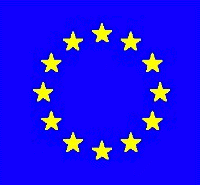|
EUROPEAN UNION RULE OF LAW MISSION KOSOVO (EULEX) |
 |
|
|
|
KOSOVO EULEX KOSOVO (EUROPEAN UNION RULE OF LAW MISSION) Duur: april 2008 –
16 februari 2010
De onafhankelijkheidsverklaring van Kosovo van 17 februari 2008 was het sluitstuk van een lange geschiedenis van conflict tussen Belgrado en Pristina. De positie van Kosovo binnen de Servische republiek is decennia lang een precaire geweest. In de jaren negentig van de vorige eeuw is het gekomen tot toenemende spanningen en onderdrukking van de Albanese bevolking van Kosovo. In de periode 1998-99 leidde dit tot de vlucht van vele duizenden mensen uit Kosovo en ernstige gewelddadigheden, die aanleiding vormden voor ingrijpen door de NAVO. Deze interventie maakte de weg vrij voor de terugkeer naar Kosovo van de ontheemden. De VN Veiligheidsraad nam in juni 1999 resolutie 1244 aan waarmee een VN interim bestuur werd ingesteld, in afwachting van een definitieve statusregeling. De onderhandelingen tussen Belgrado en Pristina leidden in de jaren hierna niet tot de gewenste oplossing. Ook de Veiligheidsraad is er telkenmale niet in geslaagd te komen tot overeenstemming c.q. een nieuwe resolutie. De kans op een onderhandelde oplossing, geëndosseerd door de Veiligheidsraad was nihil. De status quo was niet langer houdbaar, zoals ook de Secretaris-Generaal van de Verenigde Naties heeft verklaard. De EU heeft zich ten volle ingezet om tot de geprefereerde onderhandelde oplossing te komen, maar kon niet de ogen sluiten voor de realiteit. De uitgeroepen onafhankelijkheid was een onomkeerbare realiteit, die het verdiende ook formeel te worden erkend. Dat niet te doen en Kosovo in onzekerheid laten, zou leiden tot onduidelijkheid, instabiliteit en verdergaande risico’s. Kosovo voldeet aan de gebruikelijke volkenrechtelijke criteria voor erkenning: (a) een permanente bevolking, (b) een afgebakend grondgebied, (c) effectief gezag, (d) de bekwaamheid om internationale betrekkingen te onderhouden en (e) afwezigheid van onrechtmatige handelingen bij de totstandkoming van Kosovo. Daarenboven kan worden opgemerkt dat de uitroeping van de onafhankelijkheid in dit geval gelijk staat aan eenzijdige afscheiding. Een dergelijke afscheiding is toegestaan indien (a) het interne zelfbeschikkingsrecht langdurig en op grove wijze wordt geschonden en alle mogelijkheden zijn uitgeput om het zelfbeschikkingsrecht binnen de internationale grenzen van de staat te verwezenlijken, of (b) de fundamentele rechten van de mens op massale en grove wijze worden geschonden. In het licht van de situatie van voor juni 1999 en het ontbreken van uitzicht op een onderhandelde statusregeling kon derhalve worden betoogd dat de eenzijdige afscheiding door het recht op zelfbeschikking op deze gronden werd gelegitimeerd. In het licht van de geschiedenis van Kosovo binnen het voormalige Joegoslavië, de onderdrukking en schending van de mensen- en minderhedenrechten en van het langdurige interim VN-bestuur onder VR-resolutie 1244, moet Kosovo’s onafhankelijkheidsverklaring gezien worden als een geval “sui generis” dat geen precedent vormt. Daarover bestaat ook internationale overeenstemming. De onafhankelijkheidsverklaring en de ontwerpgrondwet bevatten tal van waarborgen op het gebied van minderhedenrechten. De Kosovaarse regering heeft inmiddels bevestigd nauw samen te werken met de speciaal vertegenwoordiger van de Europese Unie in Kosovo, de Nederlander Pieter Feith, die inmiddels tevens is aangewezen als ICR door de “ International Steering Group”, waarvan de instelling in het Ahtisaari-voorstel eveneens was voorzien. Als hoogste vertegenwoordiger van de internationale gemeenschap zal hij er op toezien dat de grondwet aan de internationale standaarden zal voldoen door eventuele aanpassingsvoorstellen te toetsen aan het Ahtisaari-voorstel, en de regering er op wijzen wanneer de voorstellen niet acceptabel zijn. Mandaat: EULEX heeft tot doel het bestuur, de politie, jusitite en douane van Kosovo te ondersteunen. In totaal zullen 2.000 mensen uit de EU-landen de komende tijd naar Kosovo vertrekken. De Nederlandse regering steunt de rol van de EU bij de ontwikkeling van de rechtsstaat in de jonge republiek Kosovo. Nederland heeft op 4 maart 2008 Kosovo als onafhankelijke staat erkend. Nederland acht stabiliteit in Kosovo en de gehele balkanregio van groot belang. De hulp bij het ontwikkelen van een goed functionerend politie- en justitieapparaat in Kosovo moet mede in dat licht worden gezien. Goede politie en justitie in Kosovo vormen bovendien niet in de laatste plaats een voorwaarde voor het gezamenlijke en op Europees niveau effectief bestrijden van grensoverschrijdende misdaad en illegale immigratie. De Marechaussee zal in Kosovo op verschillende politieterreinen actief zijn en zowel taken uitvoeren op het gebied van monitoren, mentoren en adviseren van de Kosovo Police Service (KPS). Daarnaast voert zij ook executieve taken uit. Nederlandse deelname: Nederland wil 40 tot
60 marechaussees, politiemensen, justitiële en civiele experts
aan de missie bijdragen. Nederland en Frankrijk onderzoeken nog
de mogelijkheid om daarnaast een gezamenlijke, geïntegreerde
Frans-Nederlandse politie-eenheid uit te zenden naar Kosovo. De
Marechaussee is aangesteld als coördinerend en formerend
Operationeel Commando. Het is voor het eerst dat de Kmar OPCO
is voor een missie. Dit betekent dat de Kmar zelf zorg draagt
voor de administratieve en logisiteke instandhouding. Hiervoor
wordt in Kosovo een nationaal Support Element (NSE) ingericht.
Verder verzorgt de Marechaussee de voorbereiding van de missieleden
die van andere departementen afkomstig zijn. De EU betaalt het
grootste deel van de kosten die aan deze missie verbonden zijn.
De kosten voor Nederland worden geschat op 8.6 miljoen euro. De
missie loopt tot 16 februari 2010. |
|
|
Deelnemende landen:
10
|
 |
 |
 |
 |
 |
 |
|
Duitsland
|
Frankrijk
|
Groot
Brittanië
|
Italië
|
Kroatië
|
Nederland
|
 |
 |
 |
 |
|
Noorwegen
|
Verenigde
Staten
|
Zweden
|
Zwitserland
|
|
|
|
COUNCIL OF
THE EUROPEAN UNION
(3) There is a need to prevent, on humanitarian grounds, possible outbreaks of violence, acts of persecution and intimidation in Kosovo, taking account, as appropriate, of the responsibility towards populations as referred to in Resolution 1674 by the United Nations Security Council on 28 April 2006. (4) On 10 April 2006,
the Council adopted Joint Action 2006/304/CFSP on the establishment
of an EU Planning Team (EUPT Kosovo) regarding a possible EU crisis
management operation in Kosovo in the field of rule of law and
possible other areas in Kosovo (6) Joint Action 2006/304/CFSP
lays down that the Head of EUPT Kosovo is, in particular, to act
under the direction of the Head of the EU crisis management operation
in Kosovo once the latter has been appointed. (8) In parallel with this Joint Action, the Council is adopting a Joint Action appointing an EU Special Representative for Kosovo. (9) In accordance with
the guidelines of the Nice European Council of 7-9 December 2000,
this Joint Action should determine the role of the SG/HR in accordance
with Articles 18 and 26 of the Treaty. (11) Considering the scale and nature of the mission established by this Joint Action, specific provisions are required concerning staff recruitment and procurement. (12) The command and control structure of the mission should be without prejudice to the contractual responsibilities of the Head of the mission towards the Commission for implementing the mission's budget. (13) The watch-keeping capability established within the Council Secretariat should be activated for this mission. (14) The European Union Rule of Law Mission in Kosovo will be conducted in a situation which may deteriorate and could harm the objectives of the Common Foreign and Security Policy as set out in Article 11 of the Treaty, HAS ADOPTED THIS JOINT
ACTION: 1. The EU hereby establishes an European Union Rule of Law Mission in Kosovo, EULEX KOSOVO (hereinafter "EULEX KOSOVO"). 2. EULEX KOSOVO shall operate in accordance with the Mission Statement set out in Article 2 and shall carry out the tasks as set out in Article 3. Article 2 In order to fulfil
the Mission Statement set out in Article 2, EULEX KOSOVO shall: Article 4 1. During the planning
and preparation phase of the mission, EUPT Kosovo shall act as
the main planning and preparation element for EULEX KOSOVO. The
Head of EUPT Kosovo shall act under the authority of the Head
of EULEX KOSOVO Article 5 1. The decision to
launch EULEX KOSOVO shall be taken by the Council upon approval
of the OPLAN. The operational phase of EULEX KOSOVO shall start
upon transfer of authority from the United Nations Mission in
Kosovo, UNMIK. 1. EULEX KOSOVO shall
be a unified ESDP mission across Kosovo. 1. The Civilian Planning
and Conduct Capability (CPCC) Director shall be the Civilian Operation
Commander for EULEX KOSOVO. 1. The Head of Mission
shall assume responsibility and exercise command and control of
EULEX KOSOVO at theatre level. Article 9 1. The numbers and
competence of the EULEX KOSOVO staff shall be consistent with
its Mission Statement set out in Article 2, the tasks set out
in Article 3 and the structure of EULEX KOSOVO set out in Article
6. 1. The status of EULEX
KOSOVO and its staff, including the privileges, immunities and
further guarantees necessary for the completion and smooth functioning
of EULEX KOSOVO, shall be agreed as appropriate. Article 11 1. EULEX KOSOVO shall
have a unified chain of command, as a crisis management operation. Article 12 1. The PSC shall exercise,
under the responsibility of the Council, political control and
strategic direction of EULEX KOSOVO. Article 13 1. Without prejudice
to the decision-making autonomy of the EU and its single institutional
framework, third States may be invited to contribute to EULEX
KOSOVO provided that they bear the cost of the staff seconded
by them, including salaries, allowances and travel expenses to
and from the theatre of operation, and to contribute to the running
costs of EULEX KOSOVO, as appropriate. 1. The Civilian Operation
Comma nder shall direct the Head of Mission's planning of security
measures and ensure their proper and effective implementation
for EULEX KOSOVO in accordance with Articles 7 and 11 and in coordination
with the Security Office of the General Secretariat of the Council. Article 15 The watch-keeping capability shall be activated for EULEX KOSOVO. Article 16 1. The financial reference
amount intended to cover the expenditure related to a period of
sixteen months starting from the approval of the OPLAN shall be
EUR 205 000 000. Article 17 1. The Council and
the Commission shall, each in accordance with its respective powers,
ensure consistency between the implementation of this Joint Action
and external activities of the Community in accordance with Article
3 of the Treaty. The Council and the Commission shall cooperate
to this end Article 18 1. The SG/HR shall
be authorised to release to the United Nations, NATO/KFOR and
to other third parties, associated with this Joint Action, EU
classified information and documents generated for the purposes
of EULEX KOSOVO up to the level of the relevant classification
respectively for each of them, in accordance with Decision 2001/264/EC.
Local technical arrangements shall be drawn up to facilitate this. The Council shall evaluate, not later than 6 months after the start of the operational phase, whether EULEX KOSOVO should be extended. Article 20 This Joint Action
shall enter into force on the date of its adoption. It shall expire
twenty eight months from the date of approval of the OPLAN. The
budget for the last twelve months before expiry shall be decided
upon separately by the Council. 1. This Joint Action
shall be published in the Official Journal of the European Union. |

